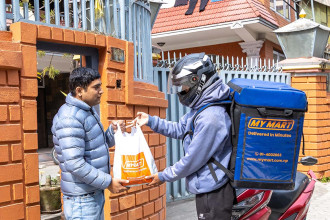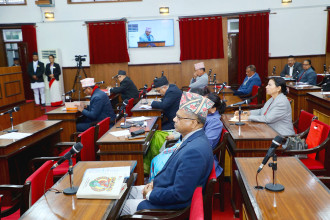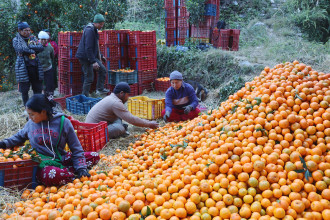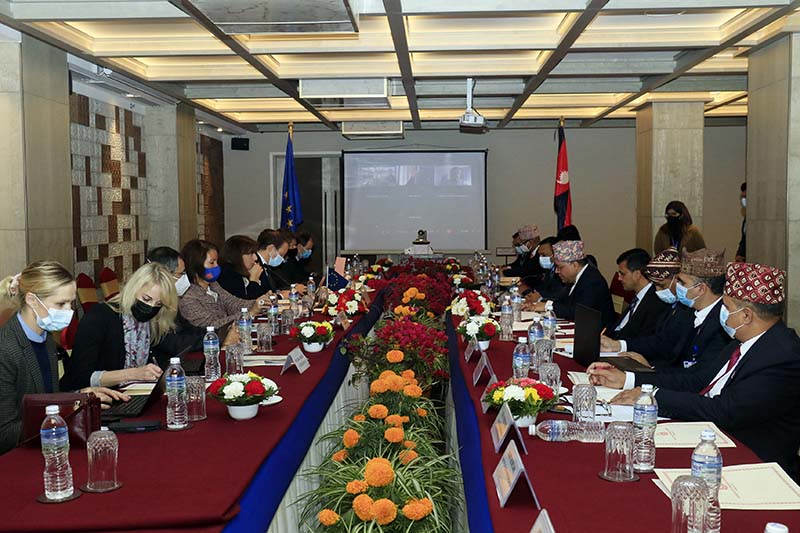
KATHMANDU: The European Union (EU) has expressed its commitment to the green resilient and inclusive development of Nepal and its readiness to extend all possible support to Nepal in achieving its development aspirations.
The EU made such a commitment in the 13th meeting of the Joint Commission between Nepal and the EU that was held in Kathmandu on November 24.
A broad range of issues of mutual interest featured the meeting. Set up in 1996, the Nepal-EU Joint Commission has proved to be a useful platform of engagement and providing momentum to further deepen the partnership between Nepal and the EU.
[caption id="attachment_16896" align="alignnone" width="800"]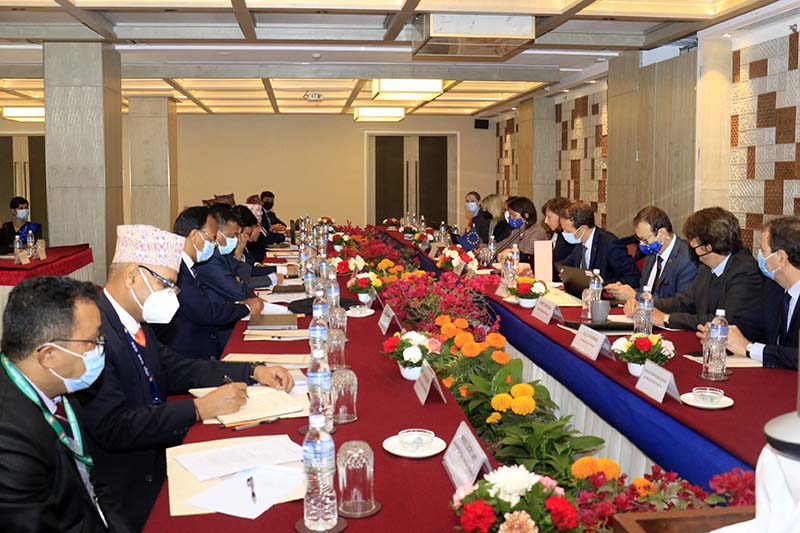 European Union and Nepali delegations take part in the 13th meeting of the Joint Commission between Nepal and the European Union (EU) being held in Kathmandu, on Wednesday, November 24, 2021. Photo: RSS[/caption]
The EU and Nepal discussed the Covid 19 pandemic and cooperation in post-pandemic recovery. Nepal conveyed its gratitude to the EU for promptly extending the support of life-saving medical items and equipment when Nepal was struggling through the devastating second wave of the pandemic in the summer this year.
Thanking the EU for its important contribution to the COVAX Facility, Nepal shared the plan of vaccinating all eligible populations by April 2022 and briefed on efforts being made by the government to contain Covid 19.
The EU welcomed Nepal’s plan to graduate from Least Developed Country (LDC) status by 2026. In this respect, the EU expressed its commitment to the Green Resilient Inclusive Development of Nepal and its readiness to extend all possible support to Nepal in achieving its development aspirations.
European Union and Nepali delegations take part in the 13th meeting of the Joint Commission between Nepal and the European Union (EU) being held in Kathmandu, on Wednesday, November 24, 2021. Photo: RSS[/caption]
The EU and Nepal discussed the Covid 19 pandemic and cooperation in post-pandemic recovery. Nepal conveyed its gratitude to the EU for promptly extending the support of life-saving medical items and equipment when Nepal was struggling through the devastating second wave of the pandemic in the summer this year.
Thanking the EU for its important contribution to the COVAX Facility, Nepal shared the plan of vaccinating all eligible populations by April 2022 and briefed on efforts being made by the government to contain Covid 19.
The EU welcomed Nepal’s plan to graduate from Least Developed Country (LDC) status by 2026. In this respect, the EU expressed its commitment to the Green Resilient Inclusive Development of Nepal and its readiness to extend all possible support to Nepal in achieving its development aspirations.
Stress on multilateral cooperation The EU and Nepal underlined the importance of effective multilateral cooperation, strengthening the World Health Organisation and strengthening global capacity to respond to future pandemics. The two sides also underlined that vaccines are public goods, hence the need of ensuring equitable access. Nepal reiterated its appreciation for the EU’s strong support for the G20 Debt Service Suspension Initiative (DSSI) as well as for the extension of the Initiative. Nepal and the EU agreed that the swift and full implementation of the DSSI by all official bilateral creditors should be a key priority in order to ensure predictability given the continuing financing pressures on the beneficiary countries owing to the pandemic. The EU informed also about the finalisation of the development programming documents under the new Neighbourhood, Development and International Cooperation Instrument (NDICI Global Europe). In the Sub-Commission on Development Cooperation held on November 23, Nepal and the EU took stock of the progress achieved and lessons learned in the implementation of ongoing cooperation. The meeting expressed satisfaction over the successful implementation of the projects and programmes envisaged under the Multiannual Indicative Programme (MIP) for Nepal for 2014-2020 in priority areas of sustainable rural development, education, and strengthening democracy and decentralisation. The EU stated that the new MIP 2021-27, to be finalised soon, will be aligned with the priorities of the current 15th Periodic Plan and support inclusive and green growth, human capital development and good governance. Nepal thanked Finland, France, Germany and the EU for the announced Team Europe Initiative on green recovery for a total amount of EUR 240 million. The EU appreciated the achievements made by Nepal in its socio-political transformation. It stressed the important role of civil society and media in strengthening democracy and good governance. The EU encouraged Nepal to further increase the participation of women in political life and the decision making process in Nepal. The EU also welcomed the commitment to transitional justice expressed by Foreign Minister Narayan Khadka at the 76th session of the UN General Assembly in September this year. Nepal presented its climate-friendly development initiative, which aims at fostering the country’s economic recovery in an ecologically sustainable manner focusing primarily on sustainable tourism, clean energy, sustainable forest management, climate-resilient agriculture, biodiversity conservation, eco-friendly transport and sustainable urbanisation. The initiative will also focus on social inclusion to empower women and disadvantaged communities through skills training and education. Nepal thanked the EU for its support to the initiative. Moreover, the EU complimented Nepal for the strong commitments expressed during the COP26 and also for the ambitious Long-Term Strategy for Net-zero Emission with the announcement to move Nepal to net zero carbon status by 2045 and offered to provide support to its implementation. [gallery columns="2" link="file" size="full" ids="16894,16895"] Nepal acknowledged the EU’s generous support to post-earthquake resilient reconstruction and recovery and appreciated the partnership in disaster risk reduction and green development. The two sides exchanged views on bilateral trade relations. The EU reiterated its longstanding commitment to supporting Nepal’s development also in view of the LDC graduation process and emphasised the need for Nepal to implement necessary requirements in view of qualifying for preferential market access under the EU’s GSP+ scheme. The Joint Commission welcomed the lending activity of the European Investment Bank (EIB) in Nepal, which will focus on climate change adaptation and mitigation as well as improved connectivity and renewable energy in the coming years. Similarly, regarding people-to-people contacts, Nepal and the EU discussed ongoing higher education cooperation, whereby a growing number of Nepali students are studying in European universities. Nepal ranks among the top 20 countries worldwide in terms of students being awarded scholarships for Erasmus Mundus Joint Master Degree programmes. Since the launch of the cooperation, about 800 students from Nepal benefited from the possibility to study at European universities.
EU requested to lift ban on Nepal Airlines Nepal briefed on its efforts made to improve air safety, notably regarding the proposed new aviation legislation. Nepal appreciated the technical support received in its endeavour to improve air safety. In view of the necessary measures taken by Nepal and its need to revive the tourism sector for economic recovery, Nepal requested the EU to lift the ban on its airlines. The EU acknowledged the positive developments and efforts made by the Civil Aviation Authority of Nepal and assured that a positive step will be taken in this direction once the necessary legislation is implemented. The EU and Nepal exchanged views on the importance of regional cooperation in South Asia (SAARC, BIMSTEC). Nepal and the EU underlined the need for further strengthening cooperation and collaboration on global and regional issues, notably on climate change, human rights, multilateralism and connectivity. They reiterated their commitments to democratic values, the rule of law, good governance and fundamental freedoms as well as promoting and protecting human rights. Nepal thanked the EU for its support in the process of Nepal’s re-election in the UN Human Rights Council (HRC) last year. The EU congratulated Nepal for successfully concluding its Universal Periodic Review earlier this year and praised Nepal for accepting a significant number of recommendations received during the proceeding. Both sides agreed to continue a regular conversation on promoting and protecting human rights. READ ALSO: Tourism Minister appeals to EU delegation to remove Nepal from blacklist
Joint commitment to rules-based order Both sides reiterated their commitment to work together in the United Nations, World Trade Organization and other international fora supporting effective multilateralism and rules-based world order. They agreed on the importance of sincerely implementing the outcome of the COP26 held in Glasgow earlier this month and taking robust measures for climate action as well as meeting the financial commitments made to support the less resourceful countries in fighting the adverse impacts of climate change. The meeting was co-chaired by Foreign Secretary Bharat Raj Paudyal from Nepal and Deputy Managing Director for Asia and the Pacific of the European External Affairs Service, Paola Pampaloni. The next joint commission meeting will take place in Brussels in 2022.
 European Union and Nepali delegations take part in the 13th meeting of the Joint Commission between Nepal and the European Union (EU) being held in Kathmandu, on Wednesday, November 24, 2021. Photo: RSS[/caption]
The EU and Nepal discussed the Covid 19 pandemic and cooperation in post-pandemic recovery. Nepal conveyed its gratitude to the EU for promptly extending the support of life-saving medical items and equipment when Nepal was struggling through the devastating second wave of the pandemic in the summer this year.
Thanking the EU for its important contribution to the COVAX Facility, Nepal shared the plan of vaccinating all eligible populations by April 2022 and briefed on efforts being made by the government to contain Covid 19.
The EU welcomed Nepal’s plan to graduate from Least Developed Country (LDC) status by 2026. In this respect, the EU expressed its commitment to the Green Resilient Inclusive Development of Nepal and its readiness to extend all possible support to Nepal in achieving its development aspirations.
European Union and Nepali delegations take part in the 13th meeting of the Joint Commission between Nepal and the European Union (EU) being held in Kathmandu, on Wednesday, November 24, 2021. Photo: RSS[/caption]
The EU and Nepal discussed the Covid 19 pandemic and cooperation in post-pandemic recovery. Nepal conveyed its gratitude to the EU for promptly extending the support of life-saving medical items and equipment when Nepal was struggling through the devastating second wave of the pandemic in the summer this year.
Thanking the EU for its important contribution to the COVAX Facility, Nepal shared the plan of vaccinating all eligible populations by April 2022 and briefed on efforts being made by the government to contain Covid 19.
The EU welcomed Nepal’s plan to graduate from Least Developed Country (LDC) status by 2026. In this respect, the EU expressed its commitment to the Green Resilient Inclusive Development of Nepal and its readiness to extend all possible support to Nepal in achieving its development aspirations.
Stress on multilateral cooperation The EU and Nepal underlined the importance of effective multilateral cooperation, strengthening the World Health Organisation and strengthening global capacity to respond to future pandemics. The two sides also underlined that vaccines are public goods, hence the need of ensuring equitable access. Nepal reiterated its appreciation for the EU’s strong support for the G20 Debt Service Suspension Initiative (DSSI) as well as for the extension of the Initiative. Nepal and the EU agreed that the swift and full implementation of the DSSI by all official bilateral creditors should be a key priority in order to ensure predictability given the continuing financing pressures on the beneficiary countries owing to the pandemic. The EU informed also about the finalisation of the development programming documents under the new Neighbourhood, Development and International Cooperation Instrument (NDICI Global Europe). In the Sub-Commission on Development Cooperation held on November 23, Nepal and the EU took stock of the progress achieved and lessons learned in the implementation of ongoing cooperation. The meeting expressed satisfaction over the successful implementation of the projects and programmes envisaged under the Multiannual Indicative Programme (MIP) for Nepal for 2014-2020 in priority areas of sustainable rural development, education, and strengthening democracy and decentralisation. The EU stated that the new MIP 2021-27, to be finalised soon, will be aligned with the priorities of the current 15th Periodic Plan and support inclusive and green growth, human capital development and good governance. Nepal thanked Finland, France, Germany and the EU for the announced Team Europe Initiative on green recovery for a total amount of EUR 240 million. The EU appreciated the achievements made by Nepal in its socio-political transformation. It stressed the important role of civil society and media in strengthening democracy and good governance. The EU encouraged Nepal to further increase the participation of women in political life and the decision making process in Nepal. The EU also welcomed the commitment to transitional justice expressed by Foreign Minister Narayan Khadka at the 76th session of the UN General Assembly in September this year. Nepal presented its climate-friendly development initiative, which aims at fostering the country’s economic recovery in an ecologically sustainable manner focusing primarily on sustainable tourism, clean energy, sustainable forest management, climate-resilient agriculture, biodiversity conservation, eco-friendly transport and sustainable urbanisation. The initiative will also focus on social inclusion to empower women and disadvantaged communities through skills training and education. Nepal thanked the EU for its support to the initiative. Moreover, the EU complimented Nepal for the strong commitments expressed during the COP26 and also for the ambitious Long-Term Strategy for Net-zero Emission with the announcement to move Nepal to net zero carbon status by 2045 and offered to provide support to its implementation. [gallery columns="2" link="file" size="full" ids="16894,16895"] Nepal acknowledged the EU’s generous support to post-earthquake resilient reconstruction and recovery and appreciated the partnership in disaster risk reduction and green development. The two sides exchanged views on bilateral trade relations. The EU reiterated its longstanding commitment to supporting Nepal’s development also in view of the LDC graduation process and emphasised the need for Nepal to implement necessary requirements in view of qualifying for preferential market access under the EU’s GSP+ scheme. The Joint Commission welcomed the lending activity of the European Investment Bank (EIB) in Nepal, which will focus on climate change adaptation and mitigation as well as improved connectivity and renewable energy in the coming years. Similarly, regarding people-to-people contacts, Nepal and the EU discussed ongoing higher education cooperation, whereby a growing number of Nepali students are studying in European universities. Nepal ranks among the top 20 countries worldwide in terms of students being awarded scholarships for Erasmus Mundus Joint Master Degree programmes. Since the launch of the cooperation, about 800 students from Nepal benefited from the possibility to study at European universities.
EU requested to lift ban on Nepal Airlines Nepal briefed on its efforts made to improve air safety, notably regarding the proposed new aviation legislation. Nepal appreciated the technical support received in its endeavour to improve air safety. In view of the necessary measures taken by Nepal and its need to revive the tourism sector for economic recovery, Nepal requested the EU to lift the ban on its airlines. The EU acknowledged the positive developments and efforts made by the Civil Aviation Authority of Nepal and assured that a positive step will be taken in this direction once the necessary legislation is implemented. The EU and Nepal exchanged views on the importance of regional cooperation in South Asia (SAARC, BIMSTEC). Nepal and the EU underlined the need for further strengthening cooperation and collaboration on global and regional issues, notably on climate change, human rights, multilateralism and connectivity. They reiterated their commitments to democratic values, the rule of law, good governance and fundamental freedoms as well as promoting and protecting human rights. Nepal thanked the EU for its support in the process of Nepal’s re-election in the UN Human Rights Council (HRC) last year. The EU congratulated Nepal for successfully concluding its Universal Periodic Review earlier this year and praised Nepal for accepting a significant number of recommendations received during the proceeding. Both sides agreed to continue a regular conversation on promoting and protecting human rights. READ ALSO: Tourism Minister appeals to EU delegation to remove Nepal from blacklist
Joint commitment to rules-based order Both sides reiterated their commitment to work together in the United Nations, World Trade Organization and other international fora supporting effective multilateralism and rules-based world order. They agreed on the importance of sincerely implementing the outcome of the COP26 held in Glasgow earlier this month and taking robust measures for climate action as well as meeting the financial commitments made to support the less resourceful countries in fighting the adverse impacts of climate change. The meeting was co-chaired by Foreign Secretary Bharat Raj Paudyal from Nepal and Deputy Managing Director for Asia and the Pacific of the European External Affairs Service, Paola Pampaloni. The next joint commission meeting will take place in Brussels in 2022.
Source: RSS
READ ALSO:
Published Date: November 25, 2021, 12:00 am
Post Comment
E-Magazine
RELATED B360 National


-1770647773.jpeg)
